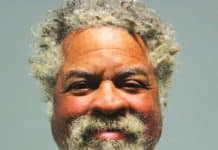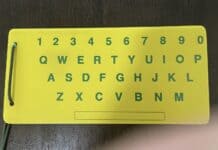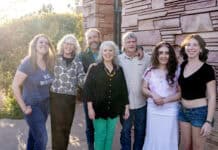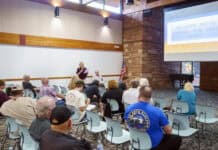After being told to turn it down all summer, Sedona musicians are frustrated.
Local bands, playing mostly outside at the Martini Bar from 7 to 10 p.m., say the noise ordinance, set at 60 decibels, is way too low. At 10 p.m., the law says, the level must drop to 50 decibels.
According to Jim Windham, the city’s development services supervisor, 60 decibels is a standard level until 10 p.m. and can be compared to “the sound of a human voice in a conversation three to four feet away.”
By Alison Ecklund
After being told to turn it down all summer, Sedona musicians are frustrated.
Local bands, playing mostly outside at the Martini Bar from 7 to 10 p.m., say the noise ordinance, set at 60 decibels, is way too low. At 10 p.m., the law says, the level must drop to 50 decibels.
According to Jim Windham, the city’s development services supervisor, 60 decibels is a standard level until 10 p.m. and can be compared to “the sound of a human voice in a conversation three to four feet away.”
Since the noise level is taken from the property line, this allows live music to be played without going over the 60 dB limit, Windham explained.
A good example, he said, was the old Sedona Cultural Park where some bands played at 94 dB, but since 30 acres surrounded it, when measured from the property line, the noise was below 60 dB.
This summer, the Sedona Police Department received 14 complaints about loud music coming from the Martini Bar — three complaints in August, five in July, three in June and three in May.
On Sept. 4, the Martini Bar received a letter from the city’s code enforcement officer stating that in light of past complaints and a recent police visit, “continued operation of loud bands in the amphitheater will likely create violations to the sound control regulations.”
The letter states that it is necessary for the bar to consider eliminating amplified outdoor music or to manage bands to maintain the legal limit.
“Failure to address this issue immediately will result in a criminal citation, or other enforcement action,” it stated.
The bar owners aren’t going to want to have live music next summer if the police keep showing up, said bass player Mike Klein, who plays at the bar every Friday night with the Eric Miller Band.
According to SPD Commun-ications and Records Supervisor Rob Allen, 98 percent of the time bands comply and turn the music down.
If bands do not turn the music down after two or three times the police show up in one night, the police can cite band members for disorderly conduct, SPD Sgt. Dave Zanot said, although he doesn’t remember that ever happening.
Bar owners could also be cited by code enforcement officers, Windham said.
“If the establishment is in violation, I look at it like the owner has charge and control of the bar,” he said.
Unlike the city’s code enforcement officers, police officers don’t have decibel readers, Allen said, but if they can hear loud music beyond the property line, they will ask the band to turn it down, and the bands always comply.
They do comply, band members said, but that doesn’t mean they like it.
“I’m confused why the standard is set so low,” drummer Eddie Barattini said of the 60 dB limit.
“I’m a recording engineer, and it’s completely unreasonable.”
When the bands are not playing, the crowd level is 64 dB on its own, he said.
Since there are fewer people complaining than the 150 or so people enjoying the show,
Klein wants to find a solution that works for everyone, he said.
Even when the bands play inside, people call the police when the door opens and closes, Klein said.
The city has told the bands that they will come out and measure and musicians can mark their instruments so they know how loud they can play, Windham said, or bars can get decibel readers themselves to make sure bands aren’t going over the limit.
“We’re actually here to help them if they call us,” Windham said.
Sedona is supposed to be an artist town, drummer Barattini said, and there are a lot of benefits to giving people a place to go for live music.
“It’s not like we’re a hard-core AC/DC show,” he said.
Alison Ecklund can be reached at 282-7795, ext. 125, or e-mail
aecklund@larsonnewspapers.com.


















